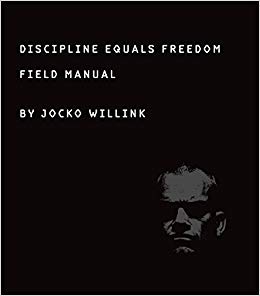After reading this book, I definitely have things to think about. It’s a book that I don’t feel like I can identify with, but that I feel like I learned from nonetheless. The first thing I learned about former Navy SEAL Jocko Willink, is that he is relentless. I am so inspired by him, both the philosophy he’s written down in this book, and his service to his country. The philosophy recorded in this manifesto is what I would call extreme, and maybe won’t fit for all people, but offers us some tactics that I think anyone can use. His commitment to a lifestyle of utter discipline is worth studying, and it also has some great tips for some new workouts and health choices to check out.
On self-discipline
By far the loudest call I heard in this very rhythmically written book was that there are no hacks, there is nothing besides your own choices and decisions every day that will make you successful.
“Self-discipline, as the very term implies, comes from the SELF. YOU. It comes when you make a decision to be disciplined. When you make a decision to be better. When you make a decision to do more, to BE more. Self-discipline comes when you decide to make a mark on the world.”
In Willink’s mind, being motivated isn’t a part of the “will I do this or not” equation. Discipline frees him from needing to make choices based on available willpower. He simply chooses to do.
On just getting started
Talking about building a new routine or habit, the language we use can be really frustrating at times – the way we talk about things is always in the future, and even worse, sometimes is time-boxed. Think of the times you’ve heard yourself or others say “I should” or “30 day challenge”. This sets us up for failure. Your vision is meaningless without action.
You have to do it. And you have to do it now. So stop thinking about it. Stop dreaming about it. Stop researching every aspect of it and reading all about it and debating the pros and cons of it … Start doing it. Take the first step and Make It Happen. Get after it and you will become the person you want to be. And you become that person through: One. Small. Decision. At. A. Time.
And this applies just as well to procrastination and staying motivated. Willink pulls a brilliant quote from Shakespeare: “Between the acting of a dreadful thing and the first motion, all the interim is like a phantasma or a hideous dream.” Action is tied fully into your commitment to being a better human. If you don’t feel like doing something, or the voice in your head is telling you to take unnecessary rest, go through the motions, push off that rest a little longer.
On stress
Willink’s view of stress is one that I see as essential to working through life with some amount of peace:
Stress is generally caused by what you can’t control. The worst thing about incoming artillery fire is you can’t control it. It is happening and you just have to accept it. Don’t stress about things you can’t control. If the stress is something tha tyou can control and you are not, that is a lack of discipline and a lack of ownership.
There are things you can’t control – accept that. If you can control it – do something!
On failure
Many sources of motivational advice right now are advocating for an embrace of failure, to stop being so afraid of failure. Willink does quite the opposite – in his mind, being afraid of failure powers him to keep working, and to work harder. Failure for him, is terrifying. It is almost as if failure doesn’t exist for him. When things are going wrong, he says “good”. So even in the midst of some struggle that some might see as failure, he is constantly leveraging that stress as an opportunity.
All in all, this is a book that had a lot of direct, aggressive advice. I found it inspiring and definitely have had his rhythmic words bouncing around in my head since I stopped reading. Give it a try and let me know what you learn!
Additionally, if you have a book group that would like to discuss Discipline Equals Freedom, I wrote down some discussion notes that I think would help guide your conversation.


